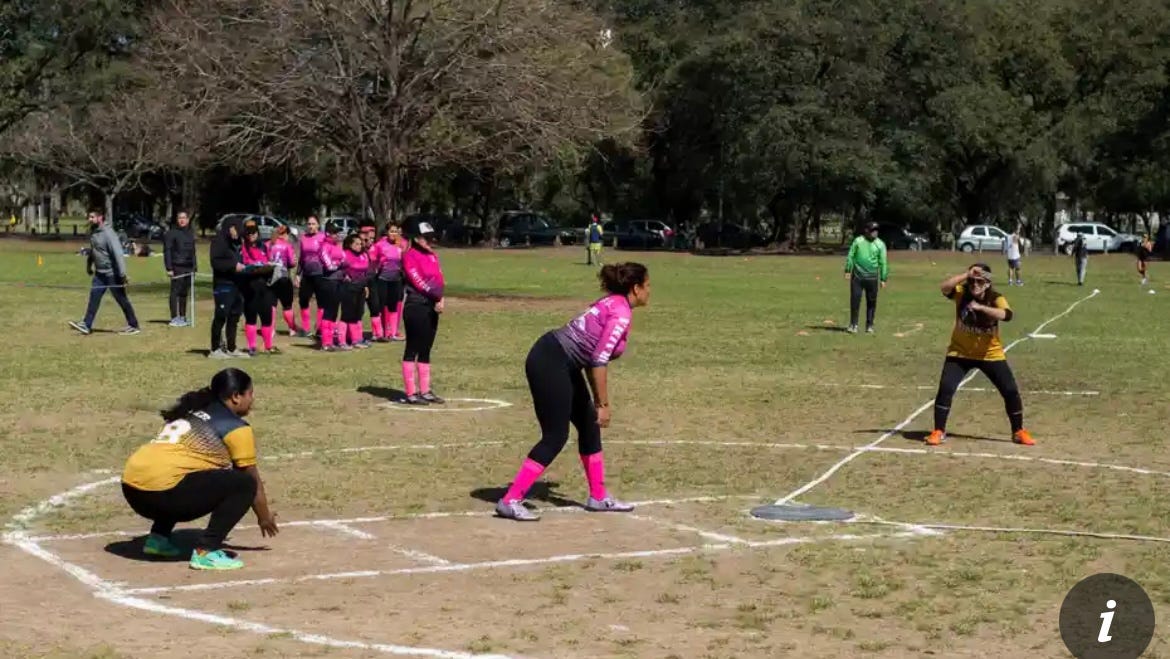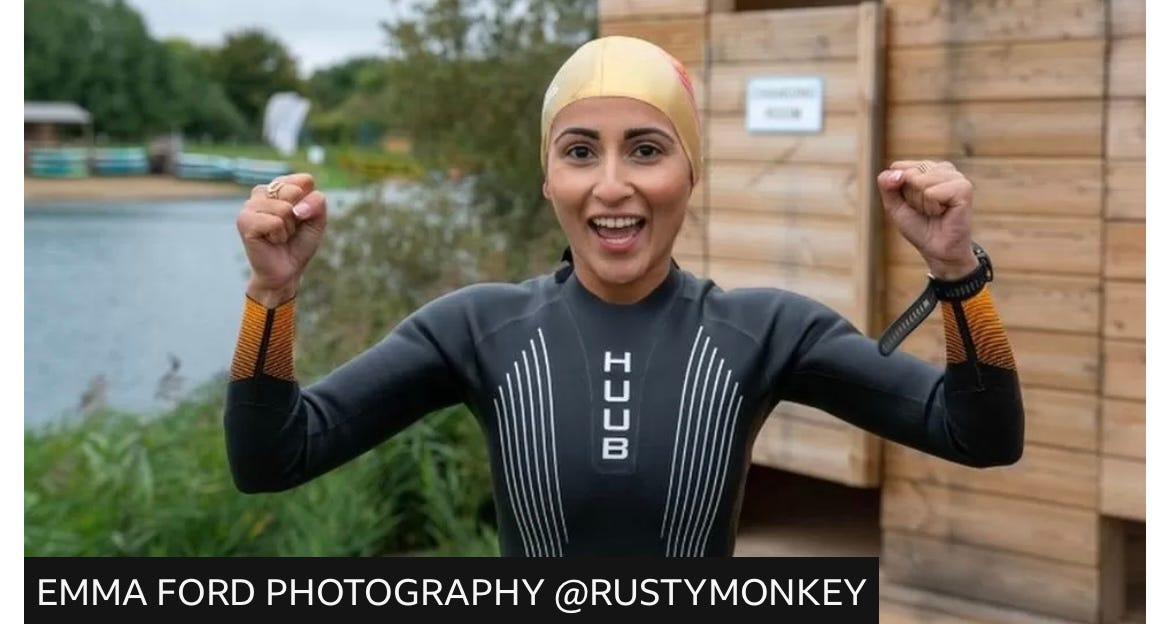Global Roundup: Honouring Lives of MMIWG, Brazil First Trans Women Elected to National Congress, Yazidi Doctor Supports Survivors, Venezuelan Refugees Play Kickingball, Brown Woman Tackles Swimming
Curated by Samiha Hossain
Debbie Gallagher, second from right, stands besides loved ones at a vigil in Saskatoon Tuesday for missing and murdered Indigenous women, girls, and gender-diverse people. Gallagher's stepdaughter went missing about two years ago. (Courtney Markewich/CBC)
October 4 marked the National Day of Action for missing and murdered Indigenous women, girls and 2SLGBTQ+ people who have been harmed by violence. Dozens of people gathered in Saskatoon, Canada for an annual vigil, one of hundreds held across the country to honour the lives of Indigenous women, girls, and gender-diverse people who are missing or have been murdered.
We are all just broken and shattered and we are trying to get through it every day. -Debbie Gallagher, stepmother of Megan Gallagher, a 30-year-old Métis woman who went missing about two years ago
The event included a flag-raising ceremony at Saskatoon city hall and jingle-dress dancing, drummers led a smudge walk to the Saskatoon Police Service headquarters where the Red Star Woman statue stands — a monument dedicated to the missing and murdered.
Among the speakers at the event was Faith Bosse, whose mother, Daleen Bosse, was reported missing in 2004. She was only seven years old when she last saw her mother, a 25-year-old University of Saskatchewan student. Daleen's body was not found until 2008. That was also the year that police were able to get her killer to reveal he was responsible for the woman's death.
The police and justice system has killed us one too many times. When will it stop? -Faith Bosse
Last week, investigators found human remains that could be linked to Megan and eight people are now facing charges in connection with her disappearance. Megan's sister, Lindsey Bishop, is currently walking across Canada to spread awareness for missing and murdered Indigenous women and girls. Debbie said the federal government needs to take immediate action and implement the 231 calls for justice from the final 2019 report of the National Inquiry into Missing and Murdered Indigenous Women and Girls — something which Indigenous activists across the country have been demanding for years.
Photo via them.us
The election did not end with a definitive winner, rather, the top two candidates, Jair Bolsonaro — the current and notably anti-LGBTQ+ president — and leftist challenger Luiz Inacio Lula da Silva advanced to the next round, which will take place on October 30. While that contest is still to be decided, voters in several parts of the country did decisively send two trans women to Congress.
Erika Hilton, a Black trans woman, won her election after campaigning to fight for education, social housing, and LGBTQ+ rights in the country.
Our mandate in Brasília will be more organized, more committed and closer to people. -Erika Hilton
Joining Hilton in celebrating an election victory is councilwoman Duda Salabert, a member of the Democratic Labor Party, who was elected to represent the state of Minas Gerais. In a video posted to her Twitter, Salabert noted that she had received the highest number of votes that any candidate had ever received in her state’s history. She also noted that she had become the target of death threats during her campaign.
I am the first trans person elected to the National Congress. We won the election, despite the attacks from leftists, attacks from Christian fundamentalists and death threats from the extreme right. - Duda Salabert
Hilton and Salabert are two of the 324 out LGBTQ+ candidates who ran during this election cycle in Brazil. Of these candidates, 18 won their elections. These wins come amid broader wins for candidates from marginalized groups that have seen great hostility from Bolsonaro, including Indigenous people. Brazil has adopted policies that seriously threaten the rights of the country’s Indigenous populations, such as halting the recognition of native lands and weakening environmental protection agencies. In addition, the country has the largest number of reported anti-trans killings of any country in the world, a trend that has held stable for many years.
Former ISIS captive Nergiz embraces Dr. Nagham during a visit to the Rwanga camp for internally displaced people in the Kurdistan region of Iraq via UNHCR/Andrew McConnell
CW: gender-based violence
Dr. Nagham Hasan is a gynecologist who has spent years providing medical and emotional care to former ISIS captives, and pledges to continue “for the long haul” despite often harrowing work. The Yazidi religious minority were particularly singled out and subjected to a devastating, genocidal campaign in 2014 because of their religious beliefs.
In August 2014, ISIS fighters captured Sinjar in north-western Iraq, executing thousands of Yazidi men, women and children, while abducting more than 6,000 Yazidis and subjecting women and girls to the most horrific of atrocities, in particular sexual violence and enslavement.
As a child in the town of Bashiqa, northern Iraq, Dr. Nagham, who is also Yazidi, noticed the injustice and abuse women faced in the wider society and decided she wanted to help. She trained as a doctor in Mosul and began her medical profession with a dream to treat women who were unable to conceive. But after 2014, her career took a different path. When everyone else was fleeing, she chose to act and headed toward the camps to treat the survivors. The former captives needed treatment for infections and injuries caused by torture and widespread sexual violence as well as their poor living conditions.
I saw the catastrophe that happened to the Yazidi women – the way they were subjected to verbal abuse and rape. -Dr. Nagham Hasan
Soon after, she established an NGO, called Hope Makers, to treat survivors while working as the director of Sheikhan General Hospital. As well as lending her medical expertise, she provides comfort to survivors with personal support.
I am here for the long haul. I have a message; I have a cause. I think [the survivors] still need help so I don’t want to give up on them. Being a Yazidi woman and having the same faith as the survivors really helped me when talking to them and understanding their needs. -Dr. Nagham Hasan
Displaced Yazidis still live in extreme poverty in camps, informal displacement sites or urban areas, while other families are still searching for missing loved ones. Many Yazidis still cannot return home to Sinjar because of the lack of public services such as health and education, the destruction of their homes, continued security challenges and a lack of access to justice.
Dr. Nagham has been chosen as the regional winner for the Middle East and North Africa of the 2022 UNHCR Nansen Refugee Award, a prestigious annual prize that honours those who have gone to extraordinary lengths to help forcibly displaced or stateless people. Her NGO, Hope Makers, now has 50 staff members, and two clinics in Sinjar offering counselling, psychiatry and community outreach for survivors returning home. Some of her former patients have even gone on to become advocates for peace and human rights in their own right, which she says is a source of great pride and happiness.
Kickingball, a mixture of football and baseball, is common in Venezuela and has found a home in the Argentine capital among refugees. Photographs: Gala Abramovich/The Guardian
Kickingball, a blend of football and baseball, is common across Venezuela and the refugees who left the country during the political and economic implosion of Nicolás Maduro’s government are bringing it to Argentina. Every Sunday, about 100 or so women from teens to middle age meet in Parque Olímpico in Buenos Aires.
María Gabriela Pratto, 29, is a financial analyst who left Venezuela in 2020 because there was no work. She was 10 when she started playing kickingball, a variation of the US sport kickball, brought to Venezuela in 1965 by teacher Charito Ramírez. By the 1980s, its popularity was such that it had its own federation and national tournaments. There are teams in every school and university in Venezuela.
The idea to start a league in Argentina began over coffee in March 2019. Diana Martínez, Anyelin Calderón, Rona Montesino and Maygle Hernández wanted to “reconnect with their roots.” There are now nine teams and the Sunday matches in the park draw spirited crowds and stalls have sprung up selling Venezuelan food and drink such as chicha (a rice drink), arepas (corn cakes) and empanadas.
A lot of families who spend Sundays in this park now know what kickingball is and they like it. They know what chicha is and they drink it … They make our culture their own. -María Gabriela Pratto
The teams are like family, particularly for the women who do not have relatives or friends in Argentina. Some of those who play are from the LGBTQ+ community, who faced discrimination at home where same-sex marriage remains illegal and laws banning discrimination in the workplace are rarely enforced.
It’s not that you have to be gay to play kickingball. But with these girls, you feel free to be who you are. You don’t have to hide or to be afraid of what people will say. -Dilimar Ramos, 30, a kinesiologist who plays for the Warriors
Later this month, the best players will be selected to play in a tournament in Colombia organized by the International Federation of Kickingball, established in 2020 with 16 member countries.
Statistics from England show people from black and Asian backgrounds are less likely to swim than those from white communities. The series sees Mughal challenged to swim 500 meters in eight weeks, with Olympians including Rebecca Adlington and Alice Dearing giving her a helping hand. She says even her dad gets involved, something she never imagined.
I've spent over 20 years embarrassed about not having a skill it feels like kids have. -Summaya Mughal
Mughal will also uncover the reasons behind why other South Asian women can not or do not swim regularly in the podcast. She wants to break down misconceptions about swimming, and encourage members of South Asian communities to learn how to swim.
The journey has tested me physically and emotionally but I'm hoping it makes a difference and encourages others to learn to swim too. After all, it could save your life. -Summaya Mughal
Kay Wright, editor at BBC Radio Leicester, called the podcast “eye-opening.” She says the team is proud of Mughal and all the work she put into the series.
Samiha Hossain (she/her) is a student at the University of Ottawa. She has experience working with survivors of sexual violence in her community, as well as conducting research on gender-based violence. A lot of her time is spent learning about and critically engaging with intersectional feminism, transformative justice and disability justice.
Samiha firmly believes in the power of connecting with people and listening to their stories to create solidarity and heal as a community. She refuses to let anyone thwart her imagination when it comes to envisioning a radically different future full of care webs, nurturance and collective liberation.






